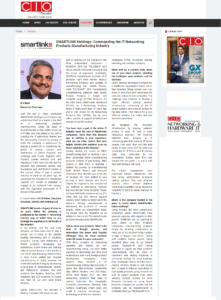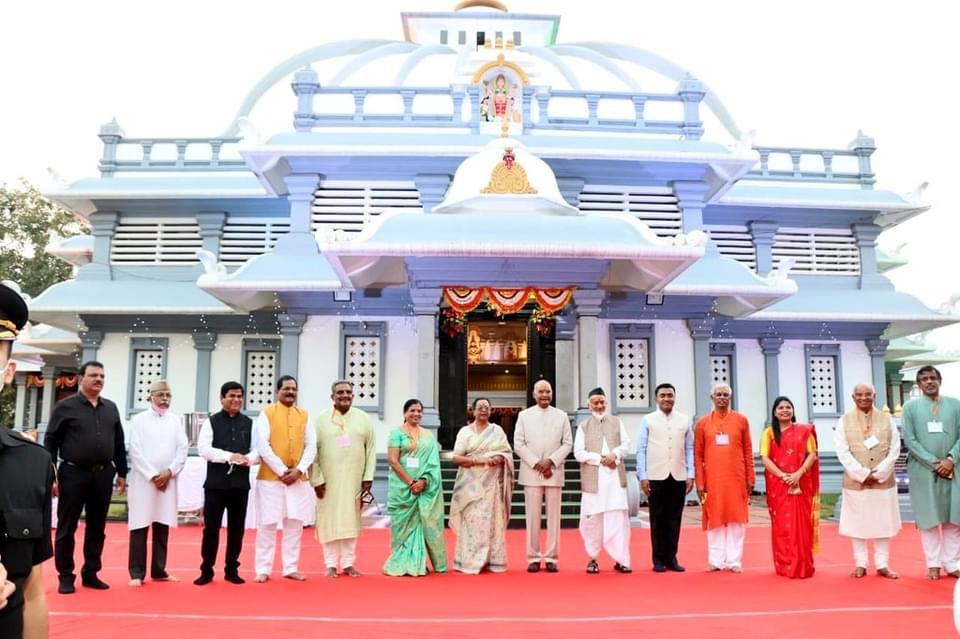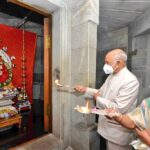K.R. Naik, Executive Chairman, Smartlink Holdings Ltd., and Chairman & Founder, Digisol Systems, traces the story of IT networking products in the country as well as his own story
For 50 years you played a key role in creating the IT networking market and the surrounding channel ecosystem in India. Could you trace your personal journey in the IT industry?
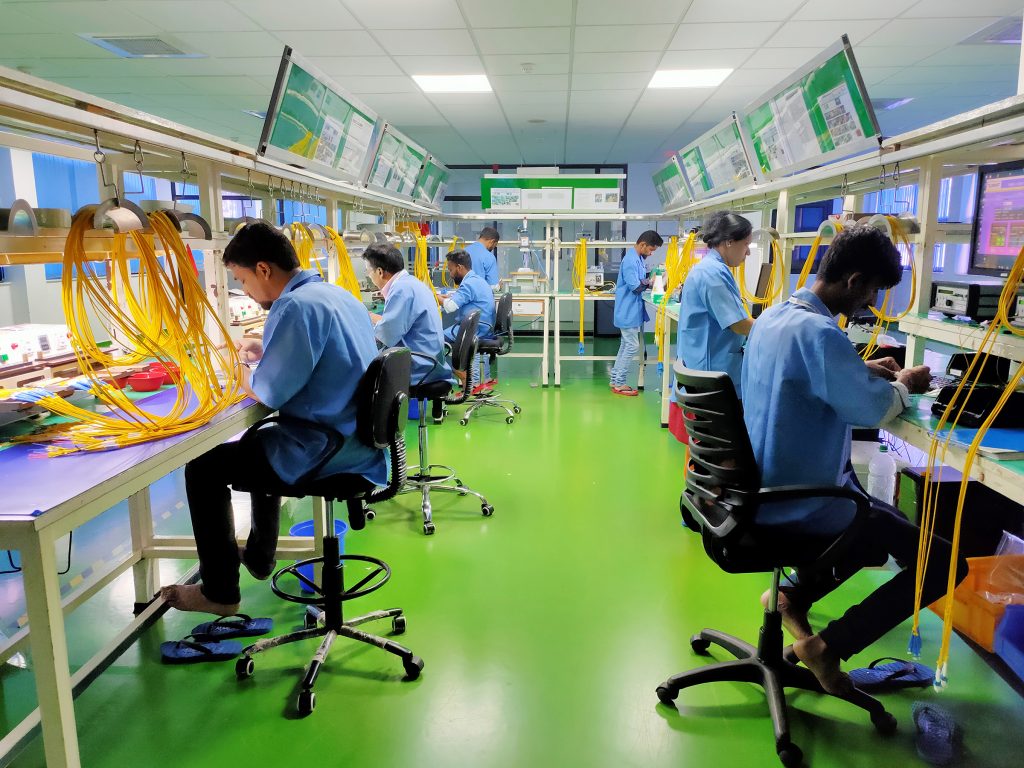 50 years ago, we used to have large sized mainframe computers, the most well-known of which was IBM. Back then, the IBM India plant used to manufacture card-punching machines, namely the IBM 029 and IBM 129 models, at its Andheri plant in Mumbai. You might be surprised to know that back then we used to export these ‘Made in India’ machines to Europe, Japan and 10-15 other countries worldwide. We had over 400 vendors supplying parts from all over India I joined the IBM manufacturing plant in 1969. Initially, IBM used to re-condition large mainframe computers. Then around 1973, we started manufacturing IBM Machines by sourcing detail parts from all over India as well as complicated importing from IBM vendors outside India. But due to government policy, IBM closed its operations in 1978. Then in 1986, I started my own venture called Virtual Computers Pvt Ltd., manufacturing personal computers (PCs) by sourcing detail parts from Singapore. I used to assemble motherboards and add-on cards at the Mumbai factory. The duty difference in detail parts imports and finished products import was as high as 60% initially. Hence, at that time, many companies sprung up all over India, manufacturing PCs. When networking products started appearing in India, I convinced D-Link Taiwan, a multinational company, to start manufacturing in India by taking advantage of the duty difference. In 1993, I shifted the factory to Goa as we needed a large area to use SMT lines. I formed a new company, Smartlink, and offered as much as 51% stake to D-Link Taiwan. In 1995, the name changed to D-Link India from Smartlink. Unfortunately, the Taiwanese Chairman Ken Kao felt sick and moved to the US. The new management was more sceptical, and invested only 19%. After two years, they raised it to 40%. It was only when they realised the latent potential that they raised the stake to 51%. D-Link products were all active networking products. However, as I had lots of experience in the passive range of products, I wanted to introduce SCS products. But Ken Kao was not comfortable using the D-Link brand for this, and asked me to use my own brand. Thus the Digilink brand was conceived. In 2005, D-Link Taiwan chose to become a brand products sales & marketing company. All R&D and manufacturing operations ceased, and a new company called Alpha Network Ltd was formed. Since import of detail parts from D-Link Taiwan was also stopped, we in India started sourcing detail parts from China and Taiwan suppliers. This ensured a huge advantage in price. Meanwhile, our passive products continued to be 100% manufactured here under the Digilink brand. Because we had a large manufacturing base, we started manufacturing other products as well. We entered into a JV with Gigabyte and began manufacturing motherboards. The business of D-Link and Digilink became 50:50. As the D-Link Taiwan parent company became a brand products trading company worldwide, both Ken Kao and I felt it was better to split the business for future growth, with one company in manufacturing with me holding the majority stake with the Digilink brand; and one product trading company – the D-Link brand with D-Link Taiwan holding the majority. So in 2008, D-Link India de-merged by changing its name back to Smartlink and continued manufacturing Digilink SCS products and all other products using SMT lines. All the stock of D-Link brand products were transferred to a newly formed products trading company, D-Link India. Business continued in Smartlink via manufacturing of Digilink passive brand products. Having 6 SMT lines in active products, Smartlink introduced the Digisol brand in 2009. Having a large manufacturing base, Smartlink also introduced tablets and motherboards. The SCS business became No 1 in channel sales in India as it had a large manufacturing base besides having its own patents. In 2011, Schneider Electric, a renowned French company in SCS products acquired the Digilink brand with all manufacturing, sales & marketing operations. We continued manufacturing all kinds of active products in the Digisol brand along with other products. As we parted off the Digilink brand’s SCS business to Schneider, D-Link India Trading Company entered the SCS market by importing finished products from China. In five years, the Digilink brand lost its channel business to D-Link. So we decided to enter the fray after a five-year hiatus. Instead of getting China products and trading, we chose to manufacture the latest patented products by forming a joint venture with a company having the latest patents. Then in the fourth quarter of 2016, we reentered the SCS products space again by manufacturing higher grade patented products. A new manufacturing company was formed by taking a foreign partner having a lot of latest patents in SCS products. To simplify operations, Smartlink became a Holding company with assets and cash. The business split in three independent units offering scope to expand – Digisol Systems (a brand products company); Telesmart SCS (for SCS products in copper and fiber having a foreign company as partner); and Synegra EMS (for all kinds of active products manufacturing, and with large space for SMT lines, soldering lines, and assembly lines). Digisol, our brand products company, sources products from Synegra and Telesmart, as well as worldwide suppliers.
50 years ago, we used to have large sized mainframe computers, the most well-known of which was IBM. Back then, the IBM India plant used to manufacture card-punching machines, namely the IBM 029 and IBM 129 models, at its Andheri plant in Mumbai. You might be surprised to know that back then we used to export these ‘Made in India’ machines to Europe, Japan and 10-15 other countries worldwide. We had over 400 vendors supplying parts from all over India I joined the IBM manufacturing plant in 1969. Initially, IBM used to re-condition large mainframe computers. Then around 1973, we started manufacturing IBM Machines by sourcing detail parts from all over India as well as complicated importing from IBM vendors outside India. But due to government policy, IBM closed its operations in 1978. Then in 1986, I started my own venture called Virtual Computers Pvt Ltd., manufacturing personal computers (PCs) by sourcing detail parts from Singapore. I used to assemble motherboards and add-on cards at the Mumbai factory. The duty difference in detail parts imports and finished products import was as high as 60% initially. Hence, at that time, many companies sprung up all over India, manufacturing PCs. When networking products started appearing in India, I convinced D-Link Taiwan, a multinational company, to start manufacturing in India by taking advantage of the duty difference. In 1993, I shifted the factory to Goa as we needed a large area to use SMT lines. I formed a new company, Smartlink, and offered as much as 51% stake to D-Link Taiwan. In 1995, the name changed to D-Link India from Smartlink. Unfortunately, the Taiwanese Chairman Ken Kao felt sick and moved to the US. The new management was more sceptical, and invested only 19%. After two years, they raised it to 40%. It was only when they realised the latent potential that they raised the stake to 51%. D-Link products were all active networking products. However, as I had lots of experience in the passive range of products, I wanted to introduce SCS products. But Ken Kao was not comfortable using the D-Link brand for this, and asked me to use my own brand. Thus the Digilink brand was conceived. In 2005, D-Link Taiwan chose to become a brand products sales & marketing company. All R&D and manufacturing operations ceased, and a new company called Alpha Network Ltd was formed. Since import of detail parts from D-Link Taiwan was also stopped, we in India started sourcing detail parts from China and Taiwan suppliers. This ensured a huge advantage in price. Meanwhile, our passive products continued to be 100% manufactured here under the Digilink brand. Because we had a large manufacturing base, we started manufacturing other products as well. We entered into a JV with Gigabyte and began manufacturing motherboards. The business of D-Link and Digilink became 50:50. As the D-Link Taiwan parent company became a brand products trading company worldwide, both Ken Kao and I felt it was better to split the business for future growth, with one company in manufacturing with me holding the majority stake with the Digilink brand; and one product trading company – the D-Link brand with D-Link Taiwan holding the majority. So in 2008, D-Link India de-merged by changing its name back to Smartlink and continued manufacturing Digilink SCS products and all other products using SMT lines. All the stock of D-Link brand products were transferred to a newly formed products trading company, D-Link India. Business continued in Smartlink via manufacturing of Digilink passive brand products. Having 6 SMT lines in active products, Smartlink introduced the Digisol brand in 2009. Having a large manufacturing base, Smartlink also introduced tablets and motherboards. The SCS business became No 1 in channel sales in India as it had a large manufacturing base besides having its own patents. In 2011, Schneider Electric, a renowned French company in SCS products acquired the Digilink brand with all manufacturing, sales & marketing operations. We continued manufacturing all kinds of active products in the Digisol brand along with other products. As we parted off the Digilink brand’s SCS business to Schneider, D-Link India Trading Company entered the SCS market by importing finished products from China. In five years, the Digilink brand lost its channel business to D-Link. So we decided to enter the fray after a five-year hiatus. Instead of getting China products and trading, we chose to manufacture the latest patented products by forming a joint venture with a company having the latest patents. Then in the fourth quarter of 2016, we reentered the SCS products space again by manufacturing higher grade patented products. A new manufacturing company was formed by taking a foreign partner having a lot of latest patents in SCS products. To simplify operations, Smartlink became a Holding company with assets and cash. The business split in three independent units offering scope to expand – Digisol Systems (a brand products company); Telesmart SCS (for SCS products in copper and fiber having a foreign company as partner); and Synegra EMS (for all kinds of active products manufacturing, and with large space for SMT lines, soldering lines, and assembly lines). Digisol, our brand products company, sources products from Synegra and Telesmart, as well as worldwide suppliers.
Tell us about your passion for passive product manufacturing After the JV with D-Link Taiwan, we started manufacturing active products in India. But I was also in passive products, having a JV with Sapphire, the UK-based company. After introducing active products, I introduced passive products by manufacturing under the D-Link brand, as had prior experience. Ken Kao was not happy to use the D-Link brand for passive products. As such, D-Link Taiwan is a multinational with more than 14 offices and with worldwide sales in more than 50 countries in only active products even today. Therefore, I introduced Digilink, my brand of SCS products.
Until the Government of India announced the second edition of production-linked incentives (PLI) schemes across 10 key sectors, Indian manufacturers were losing out to traders who were simply importing finished products or SKD from countries like China. Your comments… We all know that Indian manufacturing is nothing but importing majority of detail parts from up countries, manufacturing some parts locally, assembling & testing of products, and offering after-sales support to customers. The costs for test equipment in case of some products like fiber runs into crores of rupees. It doesn’t benefit manufacturers like us at all. On some products like switches, the basic custom duty being 10% is net saving. You’re better off importing as the manufacturing cost is quite low. Once said that, the Government’s PLI scheme is fairly encouraging. But once manufacturing of large volumes starts, and volume of consumption of detail parts increases, manufacturing of detail parts will happen in India automatically, as large volume of local requirement helps detail parts manufacturing. We too will start manufacturing some detail parts instead of importing.
Why did a reputed multinational company like Schneider Electric, which acquired a successful brand like Digilink fail to impact the market? What caused the fall of such a big multinational? After Schneider Electric acquired the Digilink brand in SCS products, manufacturing in India almost all products from components level, D-Link India’s new management decided to enter the passive products line in India by importing from China (China produces outdated patents. It’s worth noting that once a patent is 20 years old, anyone can manufacture it, even in India). Schneider, having acquired our patents, continued to manufacture here. Schneider could not compete with D-Link’s pricing, and exited from the network connectivity structured cabling business (Digilink) in India.
Is that why you decided to reenter the market after five years? Since I possessed expertise in manufacturing, I decided to reenter the passive products line by manufacturing. As I had offered my products patent to Schneider Electric while parting with the Digilink business, I decided to take a Taiwan ODM supplier as our partner, having many patents of SCS products in Taiwan. We established a new company, Telesmart SCS Ltd., and invested in tooling, moulds, test equipment, etc., and started manufacturing in Goa.
To what extent (if any) has the PLI scheme helped Indian manufacturers such as yourself negate the impact of importers. The PLI scheme will help all manufacturers. Today, we are getting more enquiries to manufacture products and so we are expanding and getting the latest SMT lines to take care of detail parts of very small size. This is the best support we have received from the Government. Let’s wait for a year or two years to see the results.
The Government’s failure to impose heavier import duty must have been a mitigating factor in the industry’s predicament… After the WTO agreement on IT products, importing became duty free, and it became difficult for the Government to impose duty. I feel at least the recent products such as FTTH routers and WiFi mobile phones should have attracted duty in order to encourage manufacturing in India. I must admit here that I have not gone through the details of the agreement.
Can you shed some light on DITT? Empowerment of the next generation must be something you feel deeply about…
 In a bid to empower our partners and system integrators across India, we launched a certification and training institution, DITT – Digisol Institute of Technical Training. The institution aims to create value for all our network engineers, channel partners, and ISPs by consistently delivering quality training programmes which are always in sync with the market demands. DITT comprises of 8+ online training programmes that cover industry-trending topics like FTTH, structured cabling solutions for tomorrow, switching and wireless solutions, etc. It comprises both free and paid training. The objective of these training programs is to enhance the knowledge of our T2 partners on the latest technological trends and to introduce them to a wide range of products that Digisol offers. Digisol has been on the forefront of empowering partners, system integrators, and ISPs/MSOs across India by conducting various training programmes under DITT. Even during the time of unprecedented uncertainty, the company took the responsibility to empower all the partners by conducting online training programmes.
In a bid to empower our partners and system integrators across India, we launched a certification and training institution, DITT – Digisol Institute of Technical Training. The institution aims to create value for all our network engineers, channel partners, and ISPs by consistently delivering quality training programmes which are always in sync with the market demands. DITT comprises of 8+ online training programmes that cover industry-trending topics like FTTH, structured cabling solutions for tomorrow, switching and wireless solutions, etc. It comprises both free and paid training. The objective of these training programs is to enhance the knowledge of our T2 partners on the latest technological trends and to introduce them to a wide range of products that Digisol offers. Digisol has been on the forefront of empowering partners, system integrators, and ISPs/MSOs across India by conducting various training programmes under DITT. Even during the time of unprecedented uncertainty, the company took the responsibility to empower all the partners by conducting online training programmes.
Tell us about your recent product developments and offerings in manufacturing for your brand company Digisol?
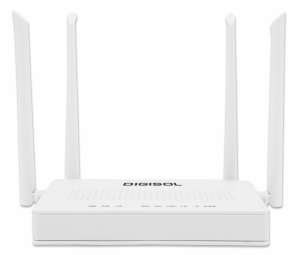
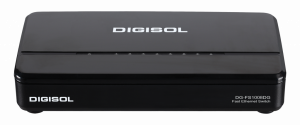
DG-GR6821AC Dual Band WiFi ONU DG-FS1008DG
The demand for FTTH products has grown enormously in recent years considering the increasing demand for high-speed internet. Our endeavour is to offer the bestin-class wireless products that offer high performance, connectivity, and are manufactured in India. We introduced our bestselling FTTH products – DG-GR1321 & DG-GR6010 XPON ONU routers as ‘Manufactured in India’ by assembling detail parts. DG-GR 1321 is designed to fulfil FTTH and triple play service demands of network operators, while the DGGR6010 ONU modem is designed to fulfil FTTH ultra-broadband access request of home and SOHO users. We are also launching our bestselling switches that are made in India. We have introduced many Made in India products previously under the passive networking range of products, and with the launch of these GEPON products, we aim to strengthen our foothold and increase our market share. Such A Long Journey Smartlink House in Verna Industrial Estate
For Next Blog: Click here!!!!


![]()
![]()


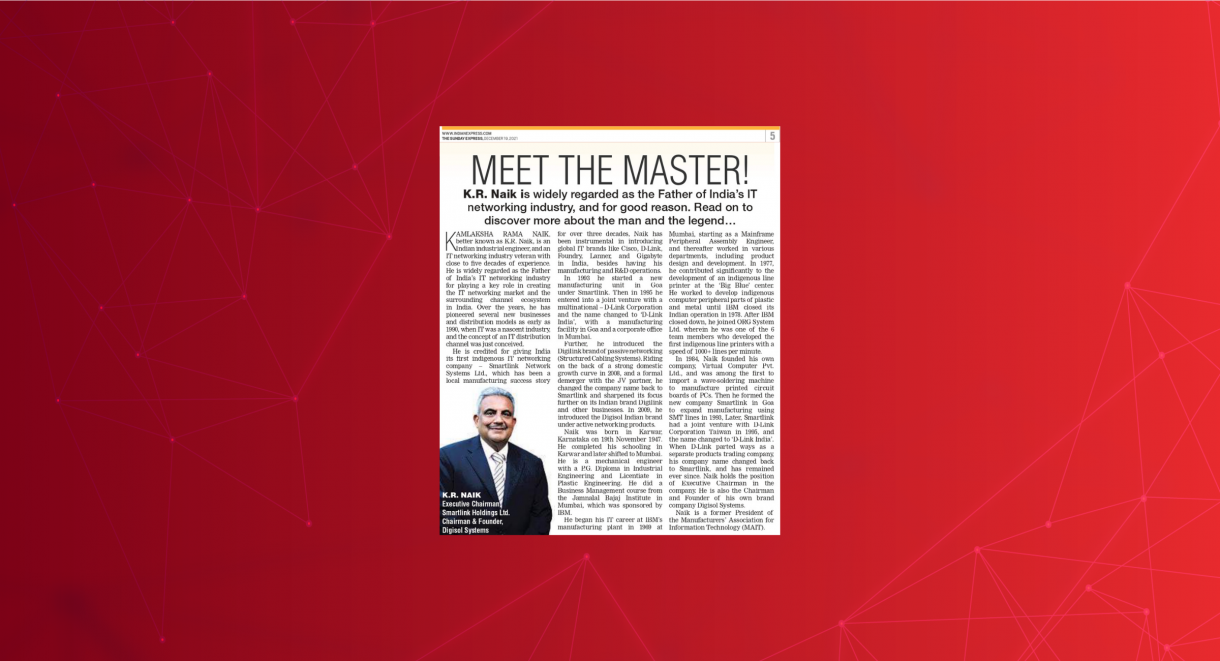
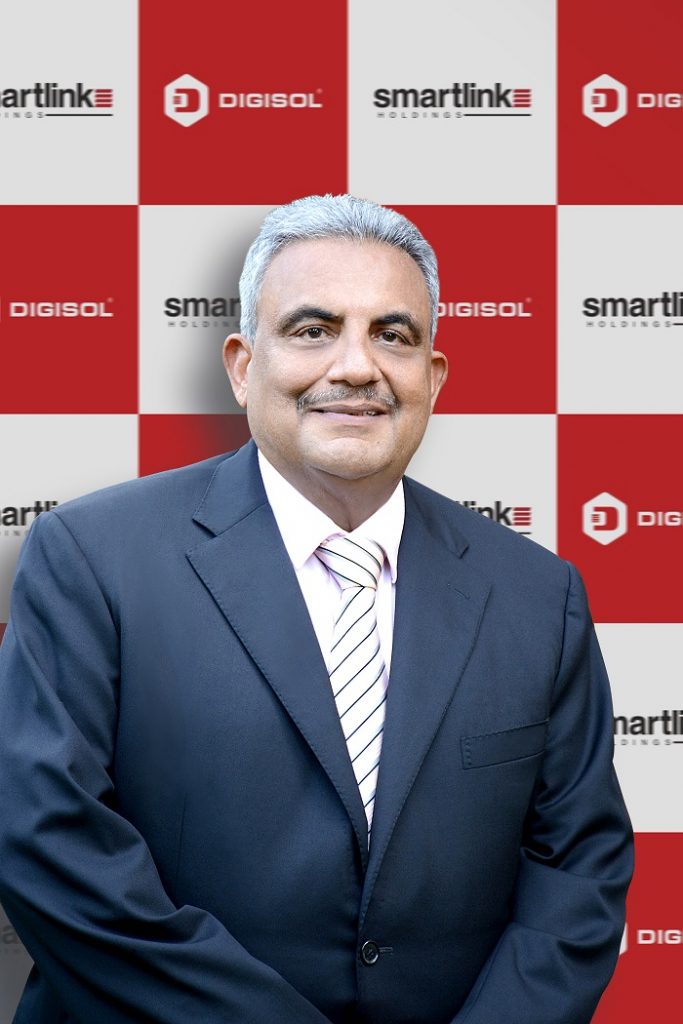 K.R. Naik is widely regarded as the Father of India’s IT networking industry, and for good reason. Read on to discover more about the man and the legend…
K.R. Naik is widely regarded as the Father of India’s IT networking industry, and for good reason. Read on to discover more about the man and the legend…
 50 years ago, we used to have large sized mainframe computers, the most well-known of which was IBM. Back then, the IBM India plant used to manufacture card-punching machines, namely the IBM 029 and IBM 129 models, at its Andheri plant in Mumbai. You might be surprised to know that back then we used to export these ‘Made in India’ machines to Europe, Japan and 10-15 other countries worldwide. We had over 400 vendors supplying parts from all over India I joined the IBM manufacturing plant in 1969. Initially, IBM used to re-condition large mainframe computers. Then around 1973, we started manufacturing IBM Machines by sourcing detail parts from all over India as well as complicated importing from IBM vendors outside India. But due to government policy, IBM closed its operations in 1978. Then in 1986, I started my own venture called Virtual Computers Pvt Ltd., manufacturing personal computers (PCs) by sourcing detail parts from Singapore. I used to assemble motherboards and add-on cards at the Mumbai factory. The duty difference in detail parts imports and finished products import was as high as 60% initially. Hence, at that time, many companies sprung up all over India, manufacturing PCs. When networking products started appearing in India, I convinced D-Link Taiwan, a multinational company, to start manufacturing in India by taking advantage of the duty difference. In 1993, I shifted the factory to Goa as we needed a large area to use SMT lines. I formed a new company, Smartlink, and offered as much as 51% stake to D-Link Taiwan. In 1995, the name changed to D-Link India from Smartlink. Unfortunately, the Taiwanese Chairman Ken Kao felt sick and moved to the US. The new management was more sceptical, and invested only 19%. After two years, they raised it to 40%. It was only when they realised the latent potential that they raised the stake to 51%. D-Link products were all active networking products. However, as I had lots of experience in the passive range of products, I wanted to introduce SCS products. But Ken Kao was not comfortable using the D-Link brand for this, and asked me to use my own brand. Thus the Digilink brand was conceived. In 2005, D-Link Taiwan chose to become a brand products sales & marketing company. All R&D and manufacturing operations ceased, and a new company called Alpha Network Ltd was formed. Since import of detail parts from D-Link Taiwan was also stopped, we in India started sourcing detail parts from China and Taiwan suppliers. This ensured a huge advantage in price. Meanwhile, our passive products continued to be 100% manufactured here under the Digilink brand. Because we had a large manufacturing base, we started manufacturing other products as well. We entered into a JV with Gigabyte and began manufacturing motherboards. The business of D-Link and Digilink became 50:50. As the D-Link Taiwan parent company became a brand products trading company worldwide, both Ken Kao and I felt it was better to split the business for future growth, with one company in manufacturing with me holding the majority stake with the Digilink brand; and one product trading company – the D-Link brand with D-Link Taiwan holding the majority. So in 2008, D-Link India de-merged by changing its name back to Smartlink and continued manufacturing Digilink SCS products and all other products using SMT lines. All the stock of D-Link brand products were transferred to a newly formed products trading company, D-Link India. Business continued in Smartlink via manufacturing of Digilink passive brand products. Having 6 SMT lines in active products, Smartlink introduced the Digisol brand in 2009. Having a large manufacturing base, Smartlink also introduced tablets and motherboards. The SCS business became No 1 in channel sales in India as it had a large manufacturing base besides having its own patents. In 2011, Schneider Electric, a renowned French company in SCS products acquired the Digilink brand with all manufacturing, sales & marketing operations. We continued manufacturing all kinds of active products in the Digisol brand along with other products. As we parted off the Digilink brand’s SCS business to Schneider, D-Link India Trading Company entered the SCS market by importing finished products from China. In five years, the Digilink brand lost its channel business to D-Link. So we decided to enter the fray after a five-year hiatus. Instead of getting China products and trading, we chose to manufacture the latest patented products by forming a joint venture with a company having the latest patents. Then in the fourth quarter of 2016, we reentered the SCS products space again by manufacturing higher grade patented products. A new manufacturing company was formed by taking a foreign partner having a lot of latest patents in SCS products. To simplify operations, Smartlink became a Holding company with assets and cash. The business split in three independent units offering scope to expand – Digisol Systems (a brand products company); Telesmart SCS (for SCS products in copper and fiber having a foreign company as partner); and Synegra EMS (for all kinds of active products manufacturing, and with large space for SMT lines, soldering lines, and assembly lines). Digisol, our brand products company, sources products from Synegra and Telesmart, as well as worldwide suppliers.
50 years ago, we used to have large sized mainframe computers, the most well-known of which was IBM. Back then, the IBM India plant used to manufacture card-punching machines, namely the IBM 029 and IBM 129 models, at its Andheri plant in Mumbai. You might be surprised to know that back then we used to export these ‘Made in India’ machines to Europe, Japan and 10-15 other countries worldwide. We had over 400 vendors supplying parts from all over India I joined the IBM manufacturing plant in 1969. Initially, IBM used to re-condition large mainframe computers. Then around 1973, we started manufacturing IBM Machines by sourcing detail parts from all over India as well as complicated importing from IBM vendors outside India. But due to government policy, IBM closed its operations in 1978. Then in 1986, I started my own venture called Virtual Computers Pvt Ltd., manufacturing personal computers (PCs) by sourcing detail parts from Singapore. I used to assemble motherboards and add-on cards at the Mumbai factory. The duty difference in detail parts imports and finished products import was as high as 60% initially. Hence, at that time, many companies sprung up all over India, manufacturing PCs. When networking products started appearing in India, I convinced D-Link Taiwan, a multinational company, to start manufacturing in India by taking advantage of the duty difference. In 1993, I shifted the factory to Goa as we needed a large area to use SMT lines. I formed a new company, Smartlink, and offered as much as 51% stake to D-Link Taiwan. In 1995, the name changed to D-Link India from Smartlink. Unfortunately, the Taiwanese Chairman Ken Kao felt sick and moved to the US. The new management was more sceptical, and invested only 19%. After two years, they raised it to 40%. It was only when they realised the latent potential that they raised the stake to 51%. D-Link products were all active networking products. However, as I had lots of experience in the passive range of products, I wanted to introduce SCS products. But Ken Kao was not comfortable using the D-Link brand for this, and asked me to use my own brand. Thus the Digilink brand was conceived. In 2005, D-Link Taiwan chose to become a brand products sales & marketing company. All R&D and manufacturing operations ceased, and a new company called Alpha Network Ltd was formed. Since import of detail parts from D-Link Taiwan was also stopped, we in India started sourcing detail parts from China and Taiwan suppliers. This ensured a huge advantage in price. Meanwhile, our passive products continued to be 100% manufactured here under the Digilink brand. Because we had a large manufacturing base, we started manufacturing other products as well. We entered into a JV with Gigabyte and began manufacturing motherboards. The business of D-Link and Digilink became 50:50. As the D-Link Taiwan parent company became a brand products trading company worldwide, both Ken Kao and I felt it was better to split the business for future growth, with one company in manufacturing with me holding the majority stake with the Digilink brand; and one product trading company – the D-Link brand with D-Link Taiwan holding the majority. So in 2008, D-Link India de-merged by changing its name back to Smartlink and continued manufacturing Digilink SCS products and all other products using SMT lines. All the stock of D-Link brand products were transferred to a newly formed products trading company, D-Link India. Business continued in Smartlink via manufacturing of Digilink passive brand products. Having 6 SMT lines in active products, Smartlink introduced the Digisol brand in 2009. Having a large manufacturing base, Smartlink also introduced tablets and motherboards. The SCS business became No 1 in channel sales in India as it had a large manufacturing base besides having its own patents. In 2011, Schneider Electric, a renowned French company in SCS products acquired the Digilink brand with all manufacturing, sales & marketing operations. We continued manufacturing all kinds of active products in the Digisol brand along with other products. As we parted off the Digilink brand’s SCS business to Schneider, D-Link India Trading Company entered the SCS market by importing finished products from China. In five years, the Digilink brand lost its channel business to D-Link. So we decided to enter the fray after a five-year hiatus. Instead of getting China products and trading, we chose to manufacture the latest patented products by forming a joint venture with a company having the latest patents. Then in the fourth quarter of 2016, we reentered the SCS products space again by manufacturing higher grade patented products. A new manufacturing company was formed by taking a foreign partner having a lot of latest patents in SCS products. To simplify operations, Smartlink became a Holding company with assets and cash. The business split in three independent units offering scope to expand – Digisol Systems (a brand products company); Telesmart SCS (for SCS products in copper and fiber having a foreign company as partner); and Synegra EMS (for all kinds of active products manufacturing, and with large space for SMT lines, soldering lines, and assembly lines). Digisol, our brand products company, sources products from Synegra and Telesmart, as well as worldwide suppliers. In a bid to empower our partners and system integrators across India, we launched a certification and training institution, DITT – Digisol Institute of Technical Training. The institution aims to create value for all our network engineers, channel partners, and ISPs by consistently delivering quality training programmes which are always in sync with the market demands. DITT comprises of 8+ online training programmes that cover industry-trending topics like FTTH, structured cabling solutions for tomorrow, switching and wireless solutions, etc. It comprises both free and paid training. The objective of these training programs is to enhance the knowledge of our T2 partners on the latest technological trends and to introduce them to a wide range of products that Digisol offers. Digisol has been on the forefront of empowering partners, system integrators, and ISPs/MSOs across India by conducting various training programmes under DITT. Even during the time of unprecedented uncertainty, the company took the responsibility to empower all the partners by conducting online training programmes.
In a bid to empower our partners and system integrators across India, we launched a certification and training institution, DITT – Digisol Institute of Technical Training. The institution aims to create value for all our network engineers, channel partners, and ISPs by consistently delivering quality training programmes which are always in sync with the market demands. DITT comprises of 8+ online training programmes that cover industry-trending topics like FTTH, structured cabling solutions for tomorrow, switching and wireless solutions, etc. It comprises both free and paid training. The objective of these training programs is to enhance the knowledge of our T2 partners on the latest technological trends and to introduce them to a wide range of products that Digisol offers. Digisol has been on the forefront of empowering partners, system integrators, and ISPs/MSOs across India by conducting various training programmes under DITT. Even during the time of unprecedented uncertainty, the company took the responsibility to empower all the partners by conducting online training programmes.


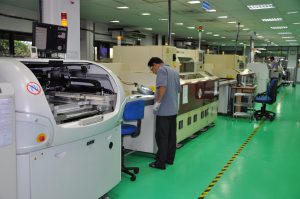 Even so, consider this. The IT revolution in India was signaled by the arrival of computer networking and the impact it made on many aspects of our lives. It was part of something bigger – electronic and digital revolution that brought us computers and a plethora of communication facilities.
Even so, consider this. The IT revolution in India was signaled by the arrival of computer networking and the impact it made on many aspects of our lives. It was part of something bigger – electronic and digital revolution that brought us computers and a plethora of communication facilities.
